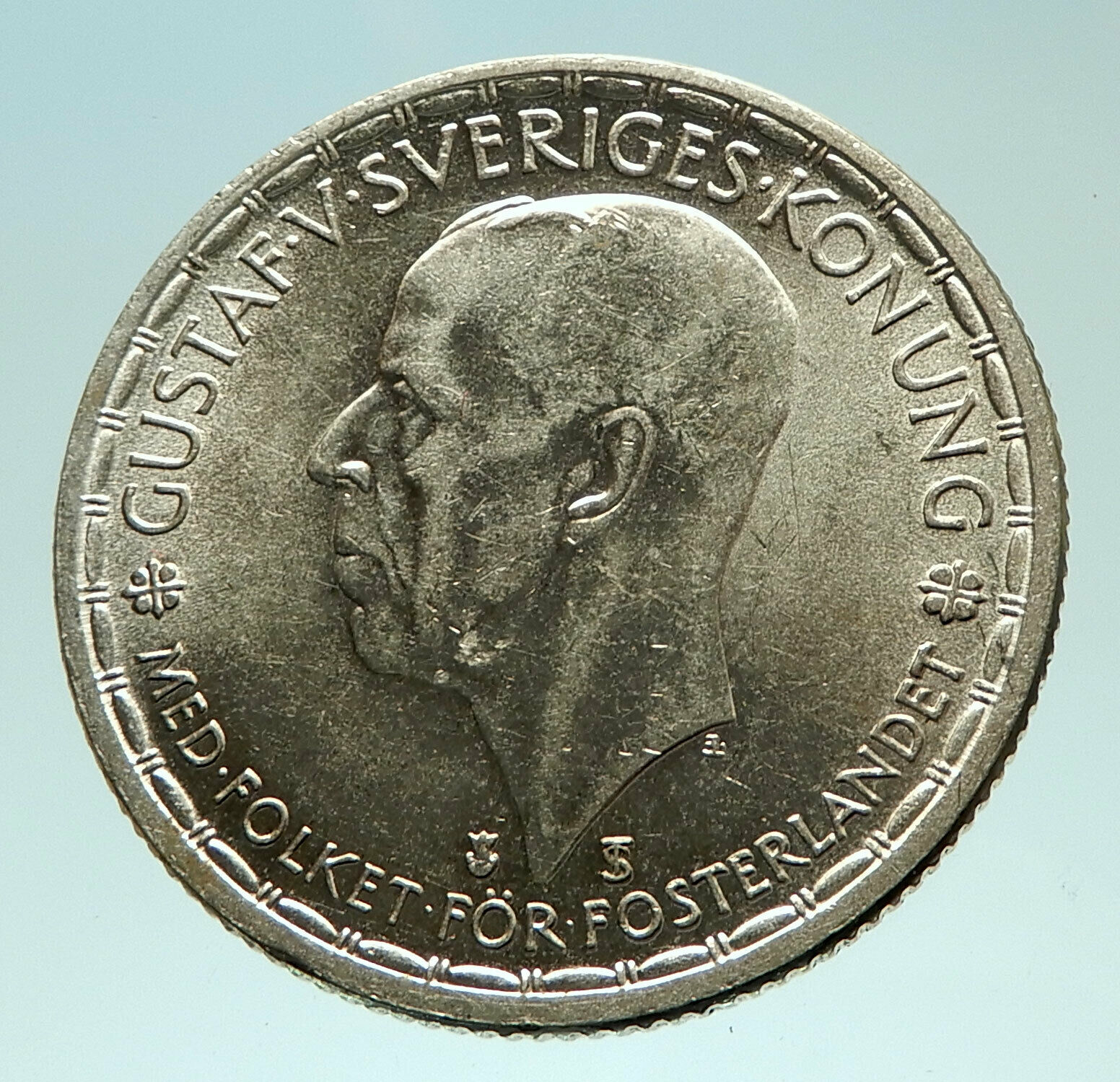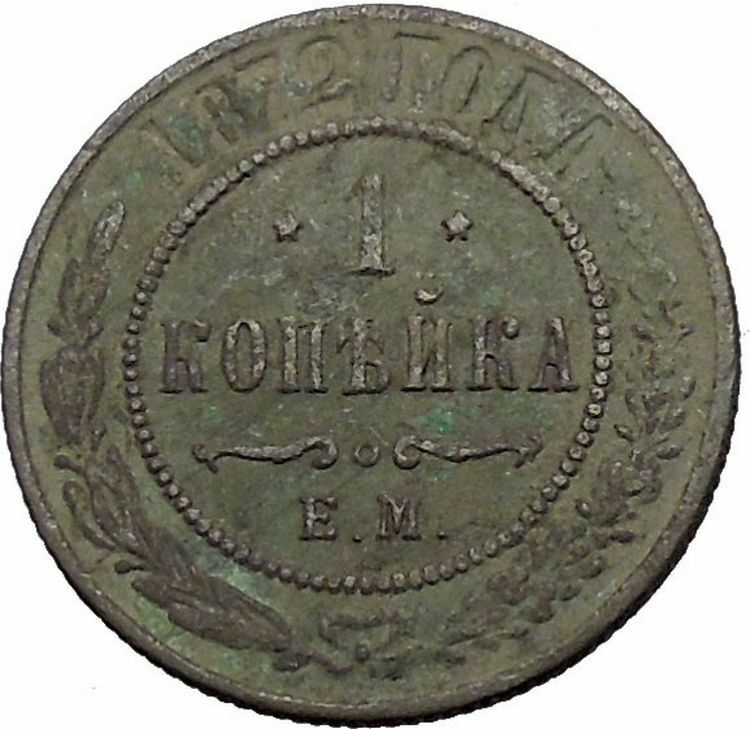|
Russia under Alexander II – Emperor: 2 March 1855 – 13 March 1881
1857 EM Copper 5 Kopeks 35.8mm (24.34 grams)
Reference: C# 152.1 (1850-1859)
Coats-of-arms, ribbons at crown.
* 5 * КОПѢЕКЪ 1865. Е. М., Intricate circumference.
You are bidding on the exact item pictured, provided with a Certificate of Authenticity and Lifetime Guarantee of Authenticity.
.jpg/220px-Zar_Alexander_II_(cropped).jpg) Alexander II (29 April 1818 – 13 March 1881) was the Emperor of Russia, King of Poland and Grand Duke of Finland from 2 March 1855 until his assassination on 13 March 1881. Alexander II (29 April 1818 – 13 March 1881) was the Emperor of Russia, King of Poland and Grand Duke of Finland from 2 March 1855 until his assassination on 13 March 1881.
Alexander’s most significant reform as emperor was emancipation of Russia’s serfs in 1861, for which he is known as Alexander the Liberator (Russian: Алекса́ндр Освободи́тель, tr. Aleksandr Osvoboditel). The tsar was responsible for other reforms, including reorganizing the judicial system, setting up elected local judges, abolishing corporal punishment, promoting local self-government through the zemstvo system, imposing universal military service, ending some privileges of the nobility, and promoting university education. After an assassination attempt in 1866, Alexander adopted a somewhat more reactionary stance until his death.
Alexander pivoted towards foreign policy and sold Alaska to the United States in 1867, fearing the remote colony would fall into British hands if there were another war. He sought peace, moved away from bellicose France when Napoleon III fell in 1871, and in 1872 joined with Germany and Austria in the League of the Three Emperors that stabilized the European situation. Despite his otherwise pacifist foreign policy, he fought a brief war with the Ottoman Empire in 1877-78, pursued further expansion into Siberia and the Caucasus, and conquered Turkestan. Although disappointed by the results of the Congress of Berlin in 1878, Alexander abided by that agreement. Among his greatest domestic challenges was an uprising in Poland in 1863, to which he responded by stripping that land of its separate constitution and incorporating it directly into Russia. Alexander was proposing additional parliamentary reforms to counter the rise of nascent revolutionary and anarchistic movements when he was assassinated in 1881.
_-_Crimea_disputed.svg/220px-Russian_Federation_(orthographic_projection)_-_Crimea_disputed.svg.png) Russia (Russian: Росси́я, tr. Rossiya), also officially known as the Russian Federation (Russian: Российская Федерация, tr. Rossiyskaya Federatsiya), is a country in Eurasia. At 17,125,200 square kilometres (6,612,100 sq mi), Russia is the largest country in the world by surface area, covering more than one-eighth of the Earth’s inhabited land area, and the ninth most populous, with over 144 million people at the end of March 2016. The European western part of the country is much more populated and urbanised than the eastern; about 77% of the population live in European Russia. Russia’s capital Moscow is one of the largest cities in the world; other major urban centers include Saint Petersburg, Novosibirsk, Yekaterinburg, Chelyabinsk, Nizhny Novgorod, Ufa and Kazan. Russia (Russian: Росси́я, tr. Rossiya), also officially known as the Russian Federation (Russian: Российская Федерация, tr. Rossiyskaya Federatsiya), is a country in Eurasia. At 17,125,200 square kilometres (6,612,100 sq mi), Russia is the largest country in the world by surface area, covering more than one-eighth of the Earth’s inhabited land area, and the ninth most populous, with over 144 million people at the end of March 2016. The European western part of the country is much more populated and urbanised than the eastern; about 77% of the population live in European Russia. Russia’s capital Moscow is one of the largest cities in the world; other major urban centers include Saint Petersburg, Novosibirsk, Yekaterinburg, Chelyabinsk, Nizhny Novgorod, Ufa and Kazan.
Extending across the entirety of Northern Asia and much of Eastern Europe, Russia spans eleven time zones and incorporates a wide range of environments and landforms. From northwest to southeast, Russia shares land borders with Norway, Finland, Estonia, Latvia, Lithuania and Poland (both with Kaliningrad Oblast), Belarus, Ukraine, Georgia, Azerbaijan, Kazakhstan, China, Mongolia and North Korea. It shares maritime borders with Japan by the Sea of Okhotsk and the U.S. state of Alaska across the Bering Strait.
The East Slavs emerged as a recognizable group in Europe between the 3rd and 8th centuries AD. Founded and ruled by a Varangian warrior elite and their descendants, the medieval state of Rus arose in the 9th century. In 988 it adopted Orthodox Christianity from the Byzantine Empire, beginning the synthesis of Byzantine and Slavic cultures that defined Russian culture for the next millennium. Rus’ ultimately disintegrated into a number of smaller states; most of the Rus’ lands were overrun by the Mongol invasion and became tributaries of the nomadic Golden Horde in the 13th century. The Grand Duchy of Moscow gradually reunified the surrounding Russian principalities, achieved independence from the Golden Horde, and came to dominate the cultural and political legacy of Kievan Rus’. By the 18th century, the nation had greatly expanded through conquest, annexation, and exploration to become the Russian Empire, which was the third largest empire in history, stretching from Poland on the west to Alaska on the east.
Following the Russian Revolution, the Russian Soviet Federative Socialist Republic became the largest and leading constituent of the Union of Soviet Socialist Republics, the world’s first constitutionally socialist state. The Soviet Union played a decisive role in the Allied victory in World War II, and emerged as a recognized superpower and rival to the United States during the Cold War. The Soviet era saw some of the most significant technological achievements of the 20th century, including the world’s first human-made satellite and the launching of the first humans in space. By the end of 1990, the Soviet Union had the world’s second largest economy, largest standing military in the world and the largest stockpile of weapons of mass destruction. Following the dissolution of the Soviet Union in 1991, twelve independent republics emerged from the USSR: Russia, Ukraine, Belarus, Kazakhstan, Uzbekistan, Armenia, Azerbaijan, Georgia, Kyrgyzstan, Moldova, Tajikistan, Turkmenistan and the Baltic states regained independence: Estonia, Latvia, Lithuania; the Russian SFSR reconstituted itself as the Russian Federation and is recognized as the continuing legal personality and sole successor state of the Soviet Union.[30] It is governed as a federal semi-presidential republic.
The Russian economy ranks as the twelfth largest by nominal GDP and sixth largest by purchasing power parity in 2015. Russia’s extensive mineral and energy resources are the largest such reserves in the world, making it one of the leading producers of oil and natural gas globally. The country is one of the five recognized nuclear weapons states and possesses the largest stockpile of weapons of mass destruction. Russia is a great power as well as a regional power and has been characterised as a potential superpower. It is permanent member of the United Nations Security Council, as well as a member of the G20, the Council of Europe, the Asia-Pacific Economic Cooperation (APEC), the Shanghai Cooperation Organisation (SCO), the Organization for Security and Co-operation in Europe (OSCE), and the World Trade Organization (WTO), as well as being the leading member of the Commonwealth of Independent States (CIS), the Collective Security Treaty Organization (CSTO) and one of the five members of the Eurasian Economic Union (EEU), along with Armenia, Belarus, Kazakhstan and Kyrgyzstan.
|





.jpg/220px-Zar_Alexander_II_(cropped).jpg) Alexander II (29 April 1818 – 13 March 1881) was the Emperor of Russia, King of Poland and Grand Duke of Finland from 2 March 1855 until his assassination on 13 March 1881.
Alexander II (29 April 1818 – 13 March 1881) was the Emperor of Russia, King of Poland and Grand Duke of Finland from 2 March 1855 until his assassination on 13 March 1881. _-_Crimea_disputed.svg/220px-Russian_Federation_(orthographic_projection)_-_Crimea_disputed.svg.png) Russia (Russian: Росси́я, tr. Rossiya), also officially known as the Russian Federation (Russian: Российская Федерация, tr. Rossiyskaya Federatsiya), is a country in Eurasia. At 17,125,200 square kilometres (6,612,100 sq mi), Russia is the largest country in the world by surface area, covering more than one-eighth of the Earth’s inhabited land area, and the ninth most populous, with over 144 million people at the end of March 2016. The European western part of the country is much more populated and urbanised than the eastern; about 77% of the population live in European Russia. Russia’s capital Moscow is one of the largest cities in the world; other major urban centers include Saint Petersburg, Novosibirsk, Yekaterinburg, Chelyabinsk, Nizhny Novgorod, Ufa and Kazan.
Russia (Russian: Росси́я, tr. Rossiya), also officially known as the Russian Federation (Russian: Российская Федерация, tr. Rossiyskaya Federatsiya), is a country in Eurasia. At 17,125,200 square kilometres (6,612,100 sq mi), Russia is the largest country in the world by surface area, covering more than one-eighth of the Earth’s inhabited land area, and the ninth most populous, with over 144 million people at the end of March 2016. The European western part of the country is much more populated and urbanised than the eastern; about 77% of the population live in European Russia. Russia’s capital Moscow is one of the largest cities in the world; other major urban centers include Saint Petersburg, Novosibirsk, Yekaterinburg, Chelyabinsk, Nizhny Novgorod, Ufa and Kazan.




